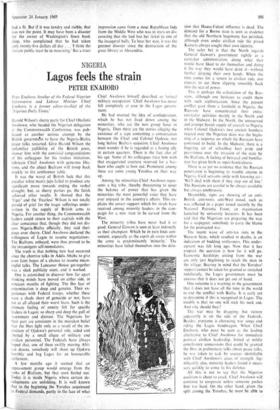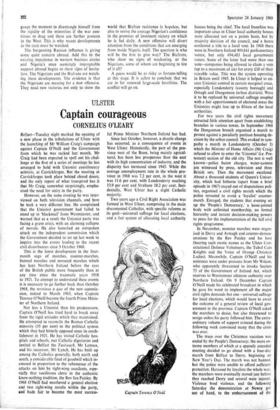Lagos feels the strain
NIGERIA
PETER ENAHORO f
Peter Enahoro, brother of the Federal Nigerian Information and Labour Minister Chief Enahoro, is a former editor-in-chief of the 'Nigerian Daily Times.'
Harold Wilson's sherry party for Chief Obafemi Awolowo, who headed the Nigerian delegation at the "CommonwealthConference, was pub- licised as another serious attempt by the British government to have the Nigeria-Biafra peace talks restarted. Give Harold Wilson the unfamiliar gullibility of the British press, shower him with the convivial congratulations of his colleagues for his tireless initiatives, lubricate Chief Awolowo with generous liba- tions, and the abject Biafrans will troop back meekly to the conference table.
It was the worst of British luck that this peculiar white man's juju failed to produce any significant move towards ending the verbal drought; but, as sherry parties go, the fetish achieved other results. It showed that the 'Tiger' and the 'Fearless' Wilson is not totally devoid of grief for the tragic sufferings under- written in the supply of British arms to Nigeria. For another thing, the Commonwealth leaders could return to their capitals with the clear conscience that, though they did not dis- cuss Nigeria-Biafra officially, they said their piece over sherry. Chief Awolowo declared the willingness of Lagos to resume negotiations. The Biafrans, unheard, were thus proved to be the intransigent self-immolators.
The truth, is that nothing new had occurred since the abortive talks in Addis Ababa to give even faint hopes of a chance to resume mean- ingful talks. The Lancaster House get-together was a sleek publicity stunt, and it worked.
One is, astonished to discover how far apart thinking minds have moved on either side, in nineteen months of fighting. The Ibo fear of extermination is deep and genuine. Their ex- periences with Federal troops, whether these were a shade short of genocide or not, have not at all allayed their worst fears. Such is the intimate feeling of enmity felt for specific leaders in Lagos; so sharp and deep the gulf, of resentment and distrust. The Nigerians for their part are consistent in the mistaken belief that the Ibos fight only as a result of the im- position of Ojukwu's personal rule, aided and abetted by a small clique of military and civilian personnel. The Federals have always hoped that, one of these swiftly moving Afri- can dawns, somebody will shoot up Ojukwu horribly and beg Lagos for an honourable settlement.
A few months ago it seemed that an appeasement group would emerge from the ranks of Biafrans, but that soon fizzled out. Today it is inside Nigeria where certain de- velopments are unfolding. It is well known that in the beginning the Yorubas acquiesced to Federal demands, partly in the face of what Chief Awolowo himself described as . 'virtual military occupation.' Chief Awolowo has never felt Completely at ease in the Lagos govern- ment.
He had mooted the idea of confederation, which he has not lived down among the minorities, who are the new group force in Nigeria. Then there are the stories alleging the existence of a tape containing a conversation between the Chief and Colonel Ojukwu, not long before Biafra's secession. Chief Awolowo must wonder if he is regarded as a lasting ally in certain quarters. There is the fact also of his age. Some of his colleagues treat him with that exaggerated courtesy reserved for a has- been who ought to bow out. Prominent among these are some young Yorubas on their way up.
Among the minorities Chief Awolowo repre- sents a big tribe, thereby threatening to upset the balance of power that has given the minorities the most powerful voice they have ever enjoyed in the country's affairs. This ex- plains the covert support which his rivals have received among minority leaders, in the cam- paign for a new state to be carved from the West.
The minority tribes have never had it so good. General Gowon is seen at least indirectly as their champion. Which he in turn finds con- venient, especially as the esprit de corps within the army is predominantly 'minority.' The minorities have lulled themselves into the delu- sion that Hausa-Fulani influence is dead. The demand for a Bornu state is seen as evidence that the old Northern hegemony has perished,
although even under civilian rule the proud Kanuris always sought their own identity. The safer bet is that the North regards General Gowon's government rightly as a caretaker administration, doing what they would have liked to do themselves and doing it the way they would have done it—without further dirtying their own hands. When the time comes for a return to civilian rule, one expects to see them slipping smoothly back into the seat of power.
This is perhaps the calculation of the Rus- sians. although one hesitates to credit them with such sophistication. Since the present conflict gave them a foothold in Nigeria, the Russians have concentrated their extra- curricular activities mainly in the North and in the Midwest. In the North, the unreserved and prompt Soviet supply of aircraft to Nigeria when Colonel Ojukwu's two ancient bombers reigned over the Nigerian skies was the begin- ning of a response on which the Russians have continued to build. In the Midwest, there is a lingering air of schoolboy hurt pride and peevishness over the invasion of the state by the Biafrans. A feeling of betrayal and humilia- tion has given birth to super-hawkishness.
There is as yet no evidence that the Russian penetration is beginning to trouble anyone in Nigeria. Civil servants smile with knowing air: 'We'll deal with them if they step out of line.' The Russians are careful to be always available but always unobtrusive.
Meanwhile, signs are showing of an anti- British, anti-NATO, anti-West mood, such as was reflected in a paper issued recently by the National Patriotic Front, an organisation launched by university lecturers. It has been said that the Nigerians are preparing the way for a scapegoat, somebody to carry the blame for the protracted war.
The recent wave of anti-tax riots in the Western State, which resulted in deaths, is an indication of budding restlessness. This under- current was felt long ago. Now that it has erupted, the question is how far it will go.
Economic hardships arising from the war are only just beginning to reach the man in the village. Bearing in mind that the Yorubas' support cannot be taken for granted or stretched indefinitely, the Lagos government must be anxious that it does not get out of hand.
One,outcome is a warning to the government that it does not have all the time in the world to end the conflict with Biafra. It is early yet to determine if this is recognised in Lagos. The trouble is that no one will stick his neck out. And why should they?
The war may be dragging, but victory apparently is on the side of the Federals.
Besides, everyone is chorusing war songs and riding the Lagos bandwagon. When Chief Enahoro, who must be seen as the leading alternative to Chief Awolowo for immediate postwar civilian leadership, hinted at mildly conciliatory concessions that could be granted the Ibos in preliminary talks about peace talks, he was taken to task by sources identifiable with Chief Awolowo's areas of strength. Sig- nificantly also, minority leaders found it neces- sary quickly to come to his defence.
All this is not to say that the Nigerian coalition is about to crack. Chief Awolowo will
continue to cooperate unless someone pushes him too hard. On the other hand, given the split among the Yorubas, he must be able to
gauge the moment to disentangle himself from the rigidity of the minorities if the war con- tinues to drag and there are further protests in the West. This is why recent developments in the state must be watched.
The burgeoning Russian influence is giving some quiet concern abroad. Add this to the existing impatience in western business circles and Nigeria's once seemingly impregnable support abroad begins to show signs of hesita- tion. The Nigerians and the Biafrans are watch- ing these developments. The evidence is that the Nigerians are massing for a new offensive. They need new victories not only to show the world that Biafran resistance is hopeless, but also to revive the average Nigerian's confidence in the promises of imminent victory on which he is fed daily. A new offensive will divert attention from the conditions that are emerging from inside Nigeria itself. The question is who will be the first to give way? The Biafrans, who show no signs of weakening, or the Nigerians, some of whom are beginning to tire of it all?
A guess would be as risky as fortune-telling at this stage. It is safest to conclude that we are in for renewed large-scale hostilities. The conflict will go on.



































 Previous page
Previous page